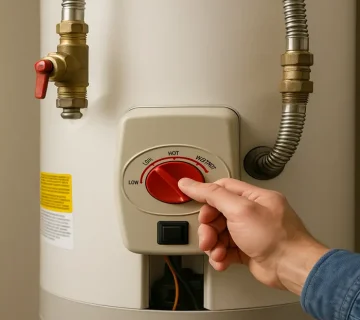Water Heater Making Noise? Don’t ignore it! Strange sounds from your water heater could indicate an underlying issue that needs attention. From knocking and hissing to popping and screeching, these noises can be frustrating—but the good news is, most of them have simple fixes.
Here are 7 powerful fixes to get your water heater running quietly again:
1. Flush Out Sediment Build-Up in Water Heater Making Noise
Over time, minerals and debris from your water supply can settle at the bottom of your water heater tank, causing popping or rumbling noises. To fix this:
- Turn off the power and water supply to the heater.
- Attach a garden hose to the drain valve and let the water flow out.
- Flush out the tank with fresh water to remove sediment.
Sediment build-up can reduce your water heater’s efficiency, increase energy bills, and even shorten its lifespan. Regular flushing every 6-12 months will keep your system in top shape.
2. Check the Temperature Setting in Water Heater Making Noise
If you hear a sizzling sound, it might be due to overheating water. Ensure the thermostat is set between 120°F and 140°F. Higher settings can cause excessive pressure and noise.
Keeping the temperature within the recommended range not only reduces noise but also improves energy efficiency and prevents scalding hazards. A well-maintained thermostat can save energy and extend the life of your heater.
3. Tighten Loose Heating Elements in Water Heater Making Noise
Electric water heaters often have heating elements that can become loose, causing humming or buzzing noises. Use a wrench to tighten the elements securely, but avoid overtightening.
Loose elements may also lead to uneven heating, reducing your water heater’s performance. Regularly inspecting and tightening these components ensures consistent heating and noise reduction.
4. Inspect the Pressure Relief Valve in Water Heater Making Noise
A whistling or high-pitched sound might indicate excessive pressure inside the tank. The pressure relief valve could be doing its job, but you should:
- Check if the valve is leaking or malfunctioning.
- Replace it if necessary.
This small yet crucial component prevents dangerous pressure build-up inside your tank. Regular checks will keep your system safe and efficient.
5. Address Water Hammer Issues in Water Heater Making Noise
Loud banging or knocking noises, especially when turning water on or off, might be due to water hammer. Installing a water hammer arrestor can help absorb the shockwaves and silence the noise.
Water hammer can also strain your plumbing system over time, leading to potential damage. Arrestors are a cost-effective way to prevent long-term issues and maintain a quiet water flow.
6. Fix a Leaking Tank in Water Heater Making Noise
If your tank is leaking and causing noise, it’s a serious problem that needs immediate attention. Unfortunately, a leaking water heater often means it’s time for a replacement.
While replacing the tank can be an investment, a new, energy-efficient model can save money in the long run by reducing energy usage and operating costs. Consult a professional to explore your options.
7. Call a Professional for Water Heater Making Noise
If you’ve tried the fixes above and the noise persists, it’s time to call an expert. Persistent noises could point to issues like:
- Faulty gas burners
- Damaged dip tubes
- Worn-out components
A professional can accurately diagnose and resolve the problem, ensuring your water heater operates safely and efficiently. Don’t wait until minor issues escalate into costly repairs.
Final Thoughts
Water Heater Making Noise isn’t just an annoyance—it’s a sign that something might be wrong. By addressing these issues promptly, you can extend the life of your water heater, improve energy efficiency, and enjoy uninterrupted hot water.
Need help fixing your water heater? Contact Value Water Heaters for expert assistance today! Visit our website, follow us on X, or connect with us on Facebook.





